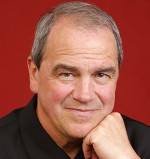Title
Last year, Hans Graf was given a Texas-sized sendoff after 12 years as music director of the Houston Symphony Orchestra. There were fancy dinners, retrospectives on a local Public Radio station, and a culminating performance of Mahler’s Second Symphony.
Body
But Graf, an elegant, exacting, and unflamboyant conductor who turns 65 this month, hasn’t been taking to the golf course in his retirement. In October he became a professor of orchestral conducting at the University Mozarteum Salzburg (Austria), one of Europe’s leading conservatories. He also continues to record and guest conduct, and on February 28, he’ll make his debut with the Juilliard Orchestra.
“When I put it together I have had 39 years of music directorships,” Graf said of his decision to retire from the H.S.O. “I don’t need to be a music director anymore,” he added, speaking by phone with The Journal from his home in Salzburg.
Plus, working as a free agent gives Graf a certain bully pulpit, a fact that can be seen in an expansive Juilliard program that includes Brahms’s Tragic Overture, Britten’s Symphony for Cello and Orchestra, and Hindemith’s Mathis der Maler. Graf wishes to champion the latter composer, saying “he taught many American composers and is undervalued by our generation.”
Composed in 1934, Mathis der Maler was extracted from an opera inspired by the paintings of Mattias Grunewald and was seen as an important statement by Hindemith, an outspoken critic of the Nazi regime. The composer fled Germany for Switzerland and then the United States soon after its premiere. The score is “Hindemith’s most accessible and understandable piece,” said Graf, who last year recorded the composer’s works for viola with the Deutsches Symphonie-Orchester, Berlin, and soloist Tabea Zimmermann.
Graf’s advocacy for Hindemith is indicative of another of his passions. Last year, he led a concert performance of Alban Berg’s Expressionist opera Wozzeck, an undertaking that took more than a year of fund-raising given the extra rehearsals and singers involved (the price tag was about $500,000). “Houston allowed me to do some things that were close to my heart,” he explained. “A concert version of Wozzeck in Texas is not an everyday thing. The organization had to go with me and believe in me.”
Graf boosted the orchestra’s national profile in other ways. He led a visually rich production called The Planets: An HD Odyssey in 2010, and in 2012 he increased the orchestra’s touring, with appearances in Moscow and at Carnegie Hall, the latter as part of the adventurously programmed Spring for Music festival.
Born in 1949 near Linz, Austria, Graf’s career began in Leningrad, where he studied conducting and met his wife, Margarita, who is Russian. He got his first full-time conducting job in Baghdad with the Iraqi National Orchestra. At that time, 1975, it was a 70-member ensemble that performed twice a month and consisted of many fine Russian-trained musicians. But it was strapped for cash and hardly considered a career milestone for a young maestro, and Graf wasn’t there for long.
In 1977 he found work as a coach at the Vienna State Opera, and two years later, he took the top prize at the Karl Boehm Competition, and offers started to pour in. Graf has since held permanent positions with the Mozarteum Orchestra in Salzburg, the Calgary Philharmonic, and France’s Orchestre National Bordeaux-Aquitaine. Critics have described him as a particularly elegant Mozartean; he’s quick to dismiss suggestions that he favors composers of an Austro-Germanic tradition, though.
Graf also insists that he doesn’t approach a conservatory rehearsal any differently than that of a professional orchestra. And though he speaks fondly of his time in Houston, when pressed, he admits that he won’t miss the fund-raising and schmoozing aspect of American music directorships. “I really miss that,” Graf said, tongue firmly in cheek. “And I really miss auditions.”





